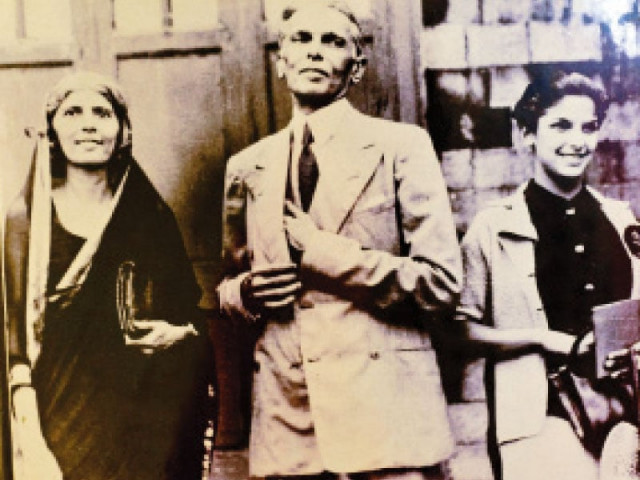Jinnah: As he looked and sounded
Over 200 black and white pictures of Jinnah and family on display.

Quaid’s pictures on display at Heritage Museum. PHOTO: MYRA IQBAL, INP
The town was abuzz since last one week with people from various walks of life paying tribute to their leader Muhammad Ali Jinnah in the run up to his anniversary - some remembering his edicts, others exhibiting rare collection of his photographs.
Empowering youth and implementing Jinnah’s vision is important for a sovereign nation, shared speakers at a conference “Vision of Quaid” organised by International Islamic University Islamabad (IIUI) and Muslim Research Institute (MRI) here on Tuesday, said a press release.
Minister for Kashmir and Gilgit-Baltistan Affairs Ch. Barjees Tahir who presided over the meeting said “Unless we govern Pakistan on the lines of Quaid’s teachings, the dream of a successful nation will not come true.”
No nation can progress with corruption in its system, so we also need to get rid of the menace of corruption, he said.
In his address IIUI President Dr Al-Draiweesh said the principles given by the great leader are in accordance with the teachings of Islam.
He termed him as versatile and honest in whatever he did and he will be live through his deeds and the vision he gave to people.
Former senator Akram Zaki paid tribute to the Jinnah saying that he was a man of law who always abided by law and told others to obey the law. “He fought the battle of freedom of Muslims with power of arguments and law, he also wanted it to prevail in the society”, he added.
The IIUI Vice President, Chairman MRI Sultan Ahmed Ali, Dr. Mumtaz, former secretary of Election Commission of Pakistan Kanwar Dilshad, Asif Rizvi, Dr. Noor Fatima, Abdul Baqi and other renowned scholars also shared their views on the Jinnah’s life, work and struggle for freedom.
A couple of miles apart, a two-day photo exhibition on Jinnah’s life opened at Lok Virsa Complex, Shakarparian today.
It was organized by National Institute of Folk & Traditional Heritage in collaboration with Directorate of Electronic Media and Publications (DEMP).
It includes 200 black & white photographs showing Jinnah’s life, his family members at various stages of the Pakistan Movement. Many photographs feature Jinnah holding official meetings and attending functions after the creation of Pakistan.
Photographs of the historical moment of the governor General addressing the first Constituent Assembly on August 14, 1947 are also on display.
Besides photographs, there are publications focusing life, struggle, work and sayings of Jinnah for visitors to buy.
The opening ceremony was held at the Heritage Museum. Parliamentary Secretary for Information, Broadcasting and National Heritage Barrister Mohsin Ranjha inaugurated the exhibition.
In his speech, Barrister Ranjha paid rich tributes to the father of the nation for his valuable contribution towards creation of Pakistan. “I am personally impressed by personality of the Quaid-i-Azam and this was the reason that I chose the profession of law. Our younger generation needs to work hard by following in the footsteps of Quaid. Our youth have a great potential, and I advise them to make the country prosperous by adopting his teachings in letter and spirit.”
The present government is determined to work for the development and prosperity of the country and its people according to the vision of our great leader, he added.
Appreciating the efforts of Lok Virsa and DEMP he said “it will go a long way in creating awareness among the masses in particular youth about the achievements of our national leader and his struggle for the creation of Pakistan”.
School children, youth, art and culture lovers and media attended the event.
Published in The Express Tribune, December 25th, 2013.

1724319076-0/Untitled-design-(5)1724319076-0-208x130.webp)

















COMMENTS
Comments are moderated and generally will be posted if they are on-topic and not abusive.
For more information, please see our Comments FAQ